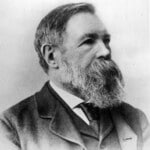About the text:
From: On Colonies, Industrial Monopoly and Working Class Movement, Futura, 1972, 57 p., p. 54-55.
(Extract)
If you had been here during the last elections you would talk differently about the Fabians [21]. In our tactics one thing is thoroughly established for all modern countries and times: to bring the workers to the point of forming their own party, independent and opposed to all bourgeois parties. During the last elections the English workers, for the first time and perhaps still only instinctively, pressed by the course of events, took a decided step in this direction; and this step has been surprisingly successful and has contributed more to the development of the minds of the workers than any other event of the last twenty years. And what did the Fabians do, not just this or that Fabian but the society as a whole? It preached and practised: affiliation of the workers to the Liberals, and what was to be expected happened: the Liberals assigned them four seats that it was impossible to win and the Fabian candidates conspicuously failed. The paradoxical belletrist Shaw – very talented and witty as a belletrist but absolutely useless as an economist and politician, although honest and not a careerist – wrote to Bebel that if they did not follow this policy of forcing their candidates on the Liberals they would reap nothing but defeat and disgrace (as if defeat) were not often more honourable than victory) and now they have pursued their policy and have reaped both.
That is the crux of the whole matter. At a time when the workers for the first time come out independently the Fabian Society advises them to remain the tail of the Liberals. …
You see something unfinished in the Fabian Society. On the contrary, this crowd is only too finished: a clique of bourgeois “Socialists” of diverse calibres, from careerists to sentimental Socialists and philanthropists, united only by their fear of the threatening rule of the workers and doing all in their power to spike this danger by making their own leadership secure, the leadership exercised by the “eddicated.” If afterwards they admit a few workers into their central board in order that they may play there the role of the worker Albert of 1848, the role of a constantly outvoted minority, this should not deceive anyone.
The means employed by the Fabian Society are just the same as those of the corrupt parliamentary politicians: money, intrigues, careerism. That is, English careerism, according to which it is self-understood that every political party (only among the workers it is supposed to be different!) pays its agents in some way or other or rewards them with posts. These people are immersed up to their necks in the intrigues of the Liberal Party, hold Liberal Party jobs, as for instance Sidney Webb, who in general is a genuine British politician. These gentry do everything that the workers have to be warned against. …
—–
[21] Fabian Society was formed in 1884. In 1900 the society joined the Labour Party.
MESC p. 446.
MEOB p. 575.
The complete text can be found online at Marxist Internet Archive, MIA.

























